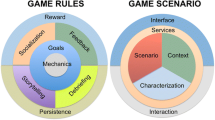Abstract
The task of entertaining people has, until very recently, been the exclusive domain of humans. However, recent advances in Artificial Intelligence (AI) suggest that intelligent systems may be used to create dynamic and engaging real-time entertainment experiences. In this paper we consider a novel technique called Experience Adaptation. Experience Adaptation is an offline process that leverages human creative ability by taking human-authored specifications of desired user experiences and autonomously “re-writing” them based on unique requirements of individual users. In this chapter, we illustrate Experience Adaptation in the context of computer-based role-playing games in which player experience is highly dependent on an unfolding plotline. Our approach uses a plan refinement technique based on partial-order planning to (a) optimize the global structure of the plotline according to input from a player model, (b) maintain plotline coherence, and (c) facilitate authorial intent by preserving as much of the original plotline as possible.
Access this chapter
Tax calculation will be finalised at checkout
Purchases are for personal use only
Preview
Unable to display preview. Download preview PDF.
Similar content being viewed by others
References
Bartle, R.: Hearts, Clubs, Diamonds, Spades: Players Who Suit MUDs. Journal of Virtual Environments 1 (1996)
Chen, S., Nelson, M.J., Sullivan, A., Mateas, M.: Evaluating the Authorial Leverage of Drama Management. In: Mehta, M., Louchart, S., Roberts, D.L. (eds.) Intelligent Narrative Technologies II: Papers from the Spring Symposium (Technical Report SS-09-06). AAAI Press, Menlo Park (2009)
Fikes, R., Nilsson, N.: STRIPS: a New Approach to the Application of Theorem Proving to Problem Solving. Artificial Intelligence 2, 189–208 (1971)
Graesser, A., Lang, K.L., Roberts, R.M.: Question Answering in the Context of Stories. Journal of Experimental Psychology: General 120, 254–277 (1991)
Hullett, K., Mateas, M.: Scenario Generation for Emergency Rescue Training Games. In: Proceedings of the Fourth International Conference on the Foundations of Digital Games (2009)
Lebowitz, M.: Planning Stories. In: Proceedings of the 9th Annual Conference of the Cognitive Science Society (1987)
Li, B., Riedl, M.O.: Planning for Individualized Experiences with Quest-Centric Game Adaptation. In: Proceedings of the ICAPS 2010 Workshop on Planning in Games (2010)
Li, B., Riedl, M.O.: An Offline Planning Approach to Game Plotline Adaptation. In: Proceedings of the 6th Conference on Artificial Intelligence for Interactive Digital Entertainment (2010)
Magerko, B.S., Riedl, M.O.: What Happens Next?: Toward an Empirical Investigation of Improvisational Theatre. In: Proceedings of the 5th International Joint Workshop on Computational Creativity (2008)
Meehan, J.: The Metanovel: Writing Stories by Computer. Ph.D. Dissertation. Yale University, New Haven (1976)
Morningstar, C., Farmer, F.R.: The Lessons of Lucasfilm’s Habitat. In: Bendikt, M. (ed.) Cyberspace: First Steps. MIT Press, Cambridge (1991)
Muñoz-Avila, H., Cox, M.: Case-Based Plan Adaptation: An Analysis and Review. IEEE Intelligent Systems 23 (2008)
Niehaus, J., Riedl, M.O.: Scenario Adaptation: An Approach to Customizing Computer-Based Training Games and Simulations. In: Proceedings of the AIED 2009 Workshop on Intelligent Educational Games (2009)
Penberthy, J., Weld, D.: UCPOP: A Sound, Complete, Partial-Order Planner for ADL. In: Proceedings of the 3rd International Conference on Knowledge Representation and Reasoning (1992)
Porteous, P., Cavazza, M.: Controlling Narrative Generation with Planning Trajectories: The Role of Constraints. In: Iurgel, I.A., Zagalo, N., Petta, P. (eds.) ICIDS 2009. LNCS, vol. 5915, pp. 234–245. Springer, Heidelberg (2009)
Riedl, M.O.: Incorporating Authorial Intent into Generative Narrative Systems. In: Mehta, M., Louchart, S., Roberts, D.L. (eds.) Intelligent Narrative Technologies II: Papers from the Spring Symposium (Technical Report SS-09-06). AAAI Press, Menlo Park (2009)
Riedl, M.O., Li, B.: Creating Customized Virtual Experiences by Leveraging Human Creative Effort: A Desideratum. In: Proceedings of the AAMAS 2010 Workshop on Collaborative Human/AI Control for Interactive Experiences (2010)
Riedl, M.O., Stern, A., Dini, D., Alderman, J.: Dynamic Experience Management in Virtual Worlds for Entertainment, Education, and Training. International Transactions on Systems Science and Applications 3 (2008)
Riedl, M.O., Young, R.M.: Narrative Planning: Balancing Plot and Character. Journal of Artificial Intelligence Research 39 (2010)
Roberts, D.L., Isbell, C.L.: A Survey and Qualitative Analysis of Recent Advances in Drama Management. International Transactions on Systems Science and Applications 3, 61–75 (2008)
Rollings, A., Adams, E.: Andrew Rollings and Ernest Adams on Game Design. New Riders, Indianapolis (2003)
Russell, S., Norvig, P.: Artificial Intelligence: A modern approach. Prentice-Hall, Englewood Cliffs (2002)
Saunders, R., Gero, J.: Curious Agents and Situated Design Evaluations. AI for Engineering, Design, Analysis, and Manufacturing 18, 153–161 (2004)
Seif El-Nasr, M.: Interaction, Narrative, and Drama Creating an Adaptive Interactive Narrative using Performance Arts Theories. Interaction Studies 8 (2007)
Sharma, M., Ontañón, S., Mehta, M., Ram, A.: Drama Management and Player Modeling for Interactive Fiction Games. Computational Intelligence 26, 183–211 (2010)
Thue, D., Bulitko, V., Spetch, M., Wasylishen, E.: Interactive Storytelling: A Player Modelling Approach. In: Proceedings of the 3rd Conference on Artificial Intelligence and Interactive Digital Entertainment Conference (2007)
Togelius, J., Yannakakis, G., Stanley, K., Browne, C.: Search-based Procedural Content Generation. In: Proceedings of the EvoStar Conference (2010)
Trabasso, T., van den Broek, P.: Causal Thinking and the Representation of Narrative Events. Journal of Memory and Language 24, 612–630 (1985)
Yee, N.: The Demographics, Motivations, and Derived Experiences of Users of Massively-Multiuser Online Graphical Environments. PRESENCE: Teleoperators and Virtual Environments 15, 309–329 (2006)
Young, R.M.: Notes on the Use of Plan Structures in the Creation of Interactive Plot. In: Mateas, M., Singers, P. (eds.) Narrative Intelligence: Papers from the Fall Symposium (Technical Report FS-99-01). AAAI Press, Menlo Park (1999)
Young, R.M., Pollack, M.E.: Decomposition and causality in partial-order planning. In: Proceedings of the 2nd International Conference on Artificial Intelligence and Planning Systems (1994)
Author information
Authors and Affiliations
Editor information
Editors and Affiliations
Rights and permissions
Copyright information
© 2011 Springer-Verlag Berlin Heidelberg
About this chapter
Cite this chapter
Li, B., Riedl, M.O. (2011). Creating Customized Game Experiences by Leveraging Human Creative Effort: A Planning Approach. In: Dignum, F. (eds) Agents for Games and Simulations II. AGS 2010. Lecture Notes in Computer Science(), vol 6525. Springer, Berlin, Heidelberg. https://doi.org/10.1007/978-3-642-18181-8_8
Download citation
DOI: https://doi.org/10.1007/978-3-642-18181-8_8
Publisher Name: Springer, Berlin, Heidelberg
Print ISBN: 978-3-642-18180-1
Online ISBN: 978-3-642-18181-8
eBook Packages: Computer ScienceComputer Science (R0)




